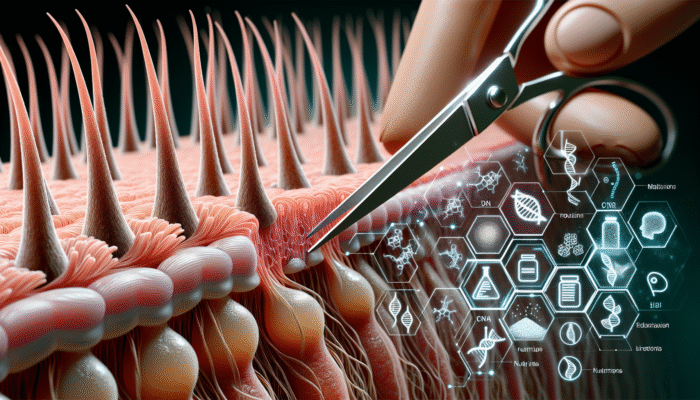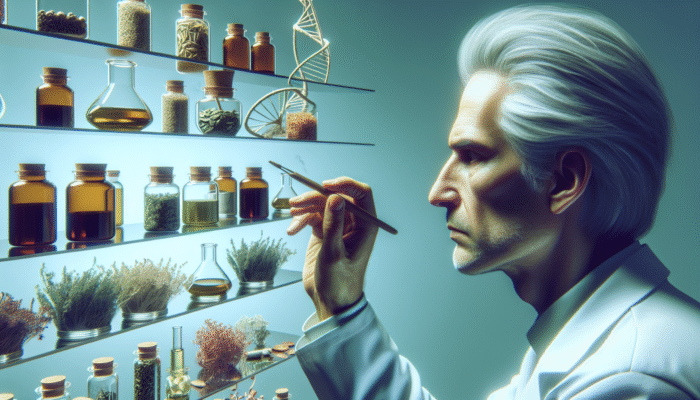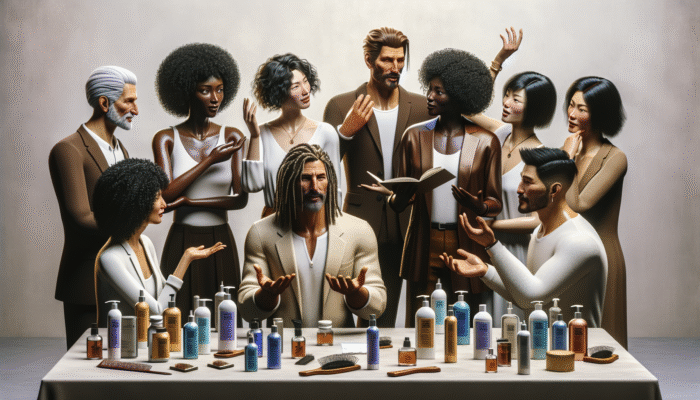Dispelling Common Myths About Hair Treatments for Healthier Hair
Understanding the Biology: Does Hair Cutting Really Enhance Growth?

The widely believed myth that cutting hair accelerates its growth has become deeply rooted in the culture surrounding beauty and grooming. However, a closer examination of the biological processes that govern hair growth reveals a more complex truth. The actual creation of hair occurs at the level of hair follicles, which are influenced by a multitude of factors including genetics, overall well-being, and hormonal balances within the body. The speed at which hair grows is primarily determined by individual genetic predispositions and dietary habits. Consequently, merely trimming hair does not change the underlying factors that dictate the growth rate of hair follicles.
Many individuals mistakenly equate hair trimming with an increase in growth rate, largely due to the immediate visual benefits of a fresh haircut. When split ends are removed, hair often appears fuller and healthier, creating the illusion of enhanced growth. This situation underscores the frequent confusion between correlation and causation; while the hair might seem rejuvenated, the actual rate of growth remains unchanged. This temporary boost in volume can positively affect self-esteem, reinforcing the belief that hair experiences accelerated growth following a trim.
For those seeking to promote healthier hair growth, there are several effective strategies to consider. First and foremost, it is crucial to adopt a balanced diet rich in essential vitamins and minerals. Nutrients such as biotin, omega-3 fatty acids, and proteins play a vital role in fostering growth from within. Moreover, prioritizing scalp health through gentle massages and the use of appropriate hair care products can invigorate the follicles, creating optimal conditions for robust growth. Additionally, protecting hair from environmental stressors and minimizing the use of excessive heat styling tools is essential for maintaining its health and longevity.
Furthermore, the psychological benefits of regular hair trimming can foster a sense of renewal, contributing to a perception of healthier hair. This emotional response can enhance self-esteem, allowing individuals to feel more confident in their appearance. Trimming hair can be approached as a proactive measure towards refreshing one’s look, thereby reinforcing the belief that such practices positively influence hair growth. However, it is crucial to understand that, according to hair care professionals, while trimming helps maintain hair health, it does not directly influence the pace of growth or the density of hair.
In summary, despite the prevalent misconception that cutting hair stimulates its growth, it is important to recognize that hair growth is primarily driven by genetics, nutritional elements, and overall health. Concentrating on dietary intake and scalp care presents significantly more advantages for effective hair growth than merely depending on trimming.
Clarifying the Myth: Does Frequent Hair Washing Lead to Hair Loss?
A common belief among individuals is that washing hair too often contributes to hair loss, a myth that has been perpetuated in various communities. In reality, hair shedding is a natural aspect of the hair growth cycle, with the average person losing between 50 and 100 strands each day. This natural shedding occurs independently of how often one shampoos their hair. Understanding this natural cycle is crucial for dispelling the fears associated with regular washing habits.
Shampooing plays an essential role in maintaining scalp health and overall hygiene. Selecting the right shampoo can effectively remove dirt, oil, and product buildup that could otherwise lead to scalp issues. It is vital to choose shampoos that cater to your specific hair type and scalp condition. For instance, individuals with oily hair may benefit from more frequent washing, while those with dry or curly hair should wash less often to maintain their hair’s natural moisture. Opting for gentle, hydrating shampoos is key to ensuring the health of both hair and scalp.
Numerous scientific studies have explored the relationship between shampooing frequency and hair loss. Research published in the *Journal of Dermatology* indicates no significant link between hair loss and how often one shampoos. This finding contradicts the traditional belief that washing hair frequently leads to increased shedding, further reinforcing the understanding that factors like genetics, hormonal changes, and underlying medical conditions are the primary contributors to hair loss.
For optimal hair health, it is advisable to select shampoos that are free of harsh chemicals, such as sulfates and parabens, as these substances can result in dryness and damage. Furthermore, incorporating an appropriate conditioner can help maintain moisture levels in the hair, thereby reducing the risk of breakage and improving overall appearance. Striking a balance in washing frequency is essential; prioritizing the needs of your hair and scalp should take precedence over adhering to strict washing guidelines based on unfounded myths.
In conclusion, the belief that frequent washing leads to hair loss is unfounded. Emphasizing scalp health, selecting appropriate products, and understanding the natural hair growth cycle are significantly more crucial for preserving hair integrity than worrying about how often to wash.
Debunking the Myth: Can Frequent Brushing Enhance Hair Health?
The idea that brushing hair 100 times a day promotes healthier strands is an outdated myth, originating from practices during the Victorian era. At that time, it was widely thought that excessive brushing could evenly distribute natural oils, resulting in a shiny appearance. However, this antiquated notion overlooks modern hair care knowledge and the potential damage caused by over-manipulating hair.
Overbrushing can be detrimental, particularly when hair is wet, as it is more susceptible to breakage. Excessive brushing may lead to frayed ends, resulting in split ends and a lackluster appearance. Different hair types dictate the appropriate brushing frequency. For instance, individuals with fine or delicate hair might find that less frequent brushing is necessary to avoid damage, while those with thicker, coarser hair may tolerate more brushing without significant adverse effects.
Contemporary hair care experts advocate for a more individualized approach to brushing. Rather than adhering to a specific number of strokes, individuals should focus on gentle detangling techniques that minimize breakage. Utilizing a wide-tooth comb or a brush specifically designed for detangling can greatly reduce the risk of damage, especially for those with curly or coily hair textures. Additionally, using a leave-in conditioner or detangling spray can enhance the brushing experience, making it smoother while providing protection to the hair from unnecessary stress.
Expert opinions regarding the myth of excessive brushing indicate a consensus that customized hair care routines yield far better results than adhering to outdated practices. Dermatologists and trichologists emphasize the importance of understanding individual hair needs, advocating against the one-size-fits-all approach of brushing 100 times. Instead, they recommend developing a brushing routine that nourishes the hair while maintaining its overall health.
In summary, the belief that excessive brushing improves hair health is a misconception that fails to account for the complexities of modern hair care. The most effective method for maintaining healthy, vibrant hair involves practicing mindful brushing habits tailored to individual hair types.
Examining the Myth: Is it Possible to Naturally Reverse Grey Hair?

The belief that grey hair can be reversed through natural remedies is a widespread myth that merits careful examination. Grey hair results from a reduction in melanin production within hair follicles, a process that is predominantly controlled by genetics and the natural aging process. Unfortunately, there is currently no scientifically validated natural method to reverse this biological change, and many assertions regarding supplements and home remedies lack substantial scientific foundation.
Common misconceptions surrounding grey hair include the idea that stress plays a significant role in this condition. While stress can lead to temporary hair loss, its direct correlation with the greying process remains largely unsupported by scientific evidence. Research indicates that genetic factors have a more considerable influence in determining when and how quickly an individual experiences greying. Accepting this reality is essential for embracing the natural aging process and its accompanying transformations.
For those who are encountering grey hair, embracing this change can mark a positive step towards self-acceptance. Many hair care brands now offer products specifically designed for grey hair, addressing its distinct texture and requirements. These products can enhance the aesthetic appeal of grey hair, providing styling and maintenance options that celebrate rather than conceal silver strands. Accepting grey hair can also serve as a powerful expression of individuality and self-confidence.
While various nutritional supplements—such as vitamin B12 and folic acid—are frequently touted as potential solutions for reversing grey hair, evidence supporting their efficacy remains limited. Although these vitamins are essential for maintaining overall hair health, they do not directly influence melanin production. Therefore, it is crucial to manage expectations regarding the impact of dietary changes on the appearance of grey hair.
The psychological effects of greying can be considerable, impacting self-esteem and mental well-being. Many individuals struggle with societal standards of beauty as they age. Recognizing that going grey is a natural part of life can foster a healthier relationship with oneself, promoting a more positive outlook on the aging journey.
In conclusion, the notion that grey hair can be reversed through natural methods is a myth lacking scientific support. Embracing grey hair with proper care and a positive mindset can cultivate greater confidence and self-acceptance as one navigates the aging process.
Are Natural Hair Care Products Always the Superior Choice for Hair Health?
Recently, the beauty industry has observed a significant surge in the popularity of natural hair care products. However, the term “natural” can often be misleading. While many consumers assume that natural products are inherently better for hair health, it is critical to analyze the ingredients and their potential effects, as some natural components can be detrimental to hair.
The meaning of “natural” in hair products can vary significantly from one brand to another, and regulatory standards for this classification are often inconsistent. Ingredients sourced from nature are not automatically safe; for example, certain essential oils may cause scalp irritation or allergic reactions. As a result, consumers must carefully scrutinize product labels and comprehend the implications of the ingredients they apply to their hair. Prioritizing the effectiveness of specific components—rather than solely their natural origin—can lead to more informed product selections.
When assessing hair care products, it is beneficial to consider individual hair types and specific concerns. For instance, individuals with curly hair might prefer products infused with natural oils for enhanced hydration, while those with fine hair may benefit from lighter formulations that do not weigh their hair down. The key lies in selecting products that address personal hair needs instead of simply following trends based on the allure of the “natural” label.
Moreover, many synthetic ingredients have been scientifically engineered to provide benefits that may not be achievable with natural alternatives. For instance, silicone, despite being a synthetic compound, can offer excellent heat protection and smoothness, making it effective for various hair styling requirements. Understanding the diverse roles of various ingredients and their performance can assist in making choices that prioritize hair health and desired outcomes.
In summary, while the appeal of “natural” hair products is understandable, it is essential to approach this trend with a discerning perspective. Evaluating the ingredients and their suitability for your hair type is far more critical than simply opting for products based on the allure of being “natural.”
Does Hair Dye Contribute to Hair Thinning or Loss?
The notion that hair dye leads to hair loss is a prevalent concern among those who enjoy altering their hair color. While it is accurate that hair dye can potentially damage the hair shaft, it does not directly result in hair loss. Understanding this distinction is crucial for anyone aiming to enhance their appearance through color treatments.
Hair dye modifies the natural structure of hair, which can lead to dryness and brittleness. This damage is often exacerbated when harsh chemical dyes or improper dyeing techniques are employed. However, the actual effect on hair loss is relatively minimal. Strands may appear thinner or seem to fall out due to breakage, but this is distinctly different from the loss of hair follicles.
Following safe hair dyeing practices is essential to minimize potential damage caused by hair dye. This includes conducting patch tests to avoid allergic reactions and utilizing products specifically formulated to reduce harm. Preparing the hair prior to dyeing, such as through deep conditioning treatments, can strengthen strands, reducing their vulnerability to the harsh effects of dye. Furthermore, considering alternative methods, such as semi-permanent dyes or natural options like henna, can be effective for achieving color without exacerbating damage.
For those concerned about hair health while coloring, consulting a professional stylist can provide valuable guidance on optimal methods and products, ensuring that the dyeing process is both safe and effective. Regular trims can also help maintain hair integrity, diminishing the appearance of damage and promoting healthier growth.
In conclusion, while hair dye can cause some level of damage to the hair itself, it does not directly lead to hair loss. By employing safe dyeing techniques and making informed product choices, individuals can enjoy the aesthetic benefits of hair color without compromising the overall health of their hair.
Frequently Asked Questions About Hair and Hair Care

Does trimming hair influence its growth rate?
No, trimming hair does not impact its growth rate. Hair growth occurs at the follicle level and is primarily determined by genetics and overall health, rather than the frequency of haircuts.
Is washing my hair daily unhealthy?
Daily washing may not be necessary for everyone. It depends largely on hair type; those with oily hair may benefit from daily cleansing, while individuals with dry or curly hair might need less frequent washing to retain moisture.
How often should I brush my hair for optimal health?
The frequency of brushing is determined by hair type. Properly detangling once or twice daily is generally sufficient; excessive brushing should be avoided to prevent breakage and damage.
Can grey hair revert to its original color?
Currently, there are no scientifically validated methods to reverse grey hair naturally. Grey hair results from genetic factors and a decrease in melanin production.
Are natural hair products always the best choice for my hair?
Not necessarily. While natural products can provide benefits for hair, some natural ingredients may be harsh. It is essential to assess ingredients and their effects based on individual hair types and needs.
Does hair dye contribute to thinning hair?
Hair dye can cause damage to the hair shaft, which may lead to breakage and the appearance of thinning hair. However, it does not directly result in hair loss from the follicles.
Are there specific foods that support hair growth?
Foods rich in vitamins A, C, D, E, zinc, iron, and omega-3 fatty acids promote healthy hair growth. A well-balanced diet can significantly enhance overall hair health and stimulate growth.
Is stress a major factor in greying hair?
While stress can lead to temporary hair loss, its link to greying hair is largely unsubstantiated. Genetics plays a more critical role in determining the timing and pace of greying.
Should I stop shampooing if my hair is thinning?
No, refraining from shampooing is unnecessary. Instead, focus on using gentle, suitable products that maintain scalp health, which can help support hair vitality and strength.
How can I improve the condition of my dyed hair?
To keep dyed hair healthy, use color-safe shampoos and conditioners, minimize heat styling, and incorporate regular deep conditioning treatments to nourish and protect the hair.
Connect with Us on Facebook for More Expert Hair Care Insights!
The Article: Common Hair Treatment Myths Debunked: Unveiling the Truth appeared first on Amitys Hair Salon.
The Article Hair Treatment Myths Debunked: Discover the Truth Was Found On https://limitsofstrategy.com

